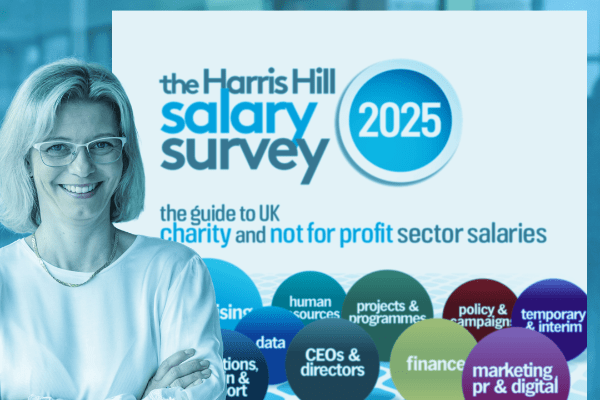Does size matter? It’s a question we’re certainly not the first to tackle - if that’s the word - but what size of charity is best for your career? The bigger the better? Or do the best things really come in small packages?
Here's what our fundraising team and deputy CEO Faye Marshall had to say in a 2019 article for The Fundraiser (relevant for most other charity jobs too), updated here for the blog.

Should you be working for a large or small charity?
As specialist recruiters we work with charities of all sizes, helping fundraisers find those best aligned with their priorities. For some the environment or location will be more important than progression, for others career development may be paramount, and for many of course, the cause in question will be top of the list.
Sometimes only one type of charity will do, but in many cases there are both larger and smaller options, each with their own advantages. So how do you know where to go?
Appropriately enough there’s no one-size-fits-all answer, but what we'd recommend generally depends on three things: where you are in your career, your experience to date and where you ultimately want to go. Let's start at the beginning.

Starting out
If it’s your first charity job, the best place for your baby steps may be the biggest organisations. That might sound counter-intuitive but as with any new job, there’ll be downtime while you learn the ropes and won’t be fully productive. You’ll also need training, and someone with the time and resources to deliver it.
All of this means there are costs, which are often unaffordable for small charities operating on little more than Hobnobs and hope.
However their larger counterparts are more likely to have support for new starters in place, as philanthropy manager Annabelle Burt told us of her role at NSPCC: "Starting my charity career in a large organisation has without a doubt been the best decision I’ve made. The organisation invests a great deal in personal development, and they’ve already given me countless opportunities to attend nationwide conferences and training with the best in the business. I’m given all the support I need to succeed in my role and really value being able to learn about different areas of the charity sector from collaborative working with other departments."

Stick or twist?
Perhaps you’ve now got a couple of years under your belt, doing direct marketing for a major charity. You're enjoying it, maybe even to the point you can't imagine doing anything else - but nevertheless it’s usually wise to diversify.
Specialising too soon may limit your options later – for example after six solid years when you see the perfect direct marketing job, but the candidates you’re competing with have four years in DM and two in other fields. Many employers will favour your competitors for their more varied, well-rounded experience. And the same of course applies should you change your mind and want to branch out later.
So it’s worth trying different things: don’t put yourself in a pigeon-hole unless you’re prepared for the possibility of living there permanently. Like beanbags, debt, and conversations with people who’ve taken up CrossFit, they’re easier to get into than out of, and best avoided if possible.

Shifting down can be the best way up
Moving to a smaller charity is often a fantastic way to branch out. Leaving that large DM department behind, you might now be a team of one - and it's unlikely to be the only thing you do.
Whatever your job title might suggest, in a small team you’ll always need to help each other out, which could mean events, community projects, partnerships with local businesses and more. And with few support staff you’ll likely do more than just fundraising, which could mean admin, marketing, media relations, procurement (somebody’s got to buy the teabags) or even catering and hospitality, because those cakes for the big event won’t bake themselves.
It's a challenge for sure, but a great way to develop existing skills and discover others you didn't know you had, while gaining diverse and multifaceted experience that's likely to broaden your future options. Speaking of which...

Further into your career: where next?
By now you’re perhaps looking for your third or fourth fundraising job, and having worked for both larger and smaller charities you’ve got the experience to go in either direction.
The best move now largely depends on where you're ultimately looking to go, so it's a good time to take stock and think hard about where that is. Then, consider what you've done and more importantly, what you haven't yet done to help you to get there, and aim to plug any gaps that could hold you back. If you’re aspiring to a directorship with a top ten charity for example, you’ll need to start boosting the big-name experience on your CV.
Ultimately it may just come down to the environment you prefer, and on which side of the whole big fish/small pond question you feel more at home. Both have their advantages (and drawbacks) of course, so here are some that we've yet to cover:
 |
|
►Autonomy can be huge part of the appeal: if you’re the entire corporate fundraising team, guess who’s in charge? If you’re used to following procedures and losing even your most brilliant ideas to multi-layered, glacially-paced approval processes, the freedom to chart your own course is both liberating and exhilarating.
► As a result you’ll be very hands-on, designing and delivering your campaigns from end to end. You’ll get to do it all yourself, the only drawback being that you’ll have to do it all yourself, but there’s a lot of satisfaction in making things happen. Whatever you do will be noticed, so you can bask in the credit when it works - though of course with nowhere to hide if it doesn’t.
► That close connection with leadership helps small charities to be more agile, changing course more quickly than their bigger brethren. Getting the whole organisation on board with your new initiative is a lot easier when you can fit everyone in one room.
► Usually you’ll also be close enough to your beneficiaries to see that you’re making a difference – something fundraisers buried far from the frontline in a major charity HQ may envy.
 |
|
► Having a well-known name can have significant advantages in key areas like fundraising and marketing. For one thing, if you don’t need to explain who you are, you’ve got more time or space to make your case. And there’s no denying it looks good on your CV. That said, while a big name might open some doors, it isn’t always an advantage: a 2018 study by the Centre for Voluntary Sector Leadership found public trust in national charities significantly lower (at just 29%) than in local community charities (43%).
► However, you’ll have more resources to call on in your fundraising efforts, and often on a larger scale: partnering with a major corporation for example, or a national TV advertising campaign, experience you’re unlikely to gain locally.
► Arguably the clearest advantage is the prospect of progression. If you’re the events person for a small charity but want to manage a team, you’ll either need to grow the charity considerably (and fast) or move somewhere big enough to have one. Even if there’s a role above you to aim for, there could be a long wait before it’s a vacancy. By nature, larger organisations will have more opportunities more often, so there’s more chance of moving up without having to move out entirely.

What about salaries and benefits?
Things are more evenly matched when it comes to things like flexible working and staff benefits. Both large and small charities tend to score highly, but large-scale events and the social side of bigger organisations may give them an edge, depending on your preference.
As for salaries, check out the Harris Hill & CharityJob 2019 Salary Report which has market rates for more than 120 different roles in the sector, including differences in pay between small, medium and large charities. While larger organisations do appear to pay a little more in general, as you might perhaps expect, the full picture is rather more complex. Most of the disparity is at senior levels, based on larger remits and scope, but at the junior end there's often very little difference. There are certainly big name charities who offer small starting salaries, knowing their brand alone will bring in new talent, just as there are smaller organisations paying above average to attract potential staff.
So at least in the early part of your career, charity size is unlikely to have a huge impact on pay. You might earn a little less at a smaller charity, but that could pay off handsomely in future thanks to your greater breadth of experience.

So where should you go next?
Most of the fundraisers we work with move between both large and small organisations several times in their career, and it’s a good strategy. The strongest CVs have a balance of both, and the breadth of experience you’ll gain will give you the option to move in either direction.
Meanwhile if you’re switching charity sizes, be sure to read the job description in detail. Jobs with the same title may have very different remits depending on the size of charity, so know what you’re in for and be wary of assumptions. Don’t let the bright lights of a big brand blind you to what’s actually a more limited role, for example, or dismiss a superb opportunity on account of a name that you’ve never heard of.
And if you’re not sure of your next move, consider where you eventually want to be, and what’s missing from your CV to get there. The chances are that’s your answer.

Final thoughts: we've inevitably made some generalisations here, and for every trend we’ve mentioned there are charities busily bucking it. But both large and small charities can offer superb career opportunities, and the best advice we can give is to make the most of them however you can.
Plenty of factors can make a great employer, so a charity’s size isn’t everything. Believe it or not, it really is what you do with it that counts.
Faye Marshall, director of permanent recruitment and deputy CEO, Harris Hill
Search all charity jobs ►
More from the Harris Hill blog
| | |
Charity Careers 5: meet SPANA's Chris Oak, Associate Director of HR ► |
| |
| ||
|
-

Opportunity for all
Find out how we’re working to deliver more diverse, equitable and inclusive recruitment…
-

Recruiting a charity CEO?
Our executive recruitment specialists have an exceptional record of successful CEO, chair, trustee and…
-

Charity sector salaries
Our 2025 Salary Survey has the latest rates and expert insight for roles throughout the sector.













